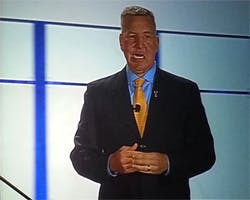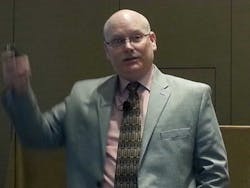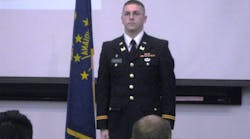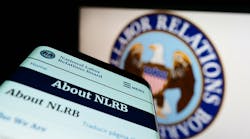Oct 18 2006, while insurgents were making parts of Iraq particularly dangerous, Major Justin Constantine was showing a reporter some of the infrastructure repairs the Marines were working on. Suddenly a shot rang out and a bullet struck Constantine behind left ear, exiting through his mouth and shredding the right side of his face in the process. Reacting with a combination of training and instinct, Corpsman George Grant ran over and performed rescue breathing and an emergency tracheotomy, saving Constantine’s life when others in the vicinity thought he was already lost.
Constantine lived to tell about this incident. In fact he did so for an audience attending the second day of WERC’s annual conference in Chicago this week. He was invited to tell his story and demonstrate to logistics professionals facing seemingly unbeatable odds what dedicated, trained human beings can accomplish under extreme stress. While during his keynote presentation Constantine lauded Corpsman Grant for his courageous action, he also quoted the typically Marine response Grant gives to people who compliment him for his bravery: “I was just doing my job.”
“This applies to all of you,” Constantine said, “including first line supervisors going about their daily work. Are your people committed to their company and their fellow employees as George Grant was? Does your staff feel motivated to perform beyond expectations?”
The secret to achieving George Grant’s and Justin Constantine’s level of dedication to mission is to share your vision of the mission with them. But for that vision to inspire action, the following question needs an affirmative answer:
Do leadership opportunities exist for all, no matter what the position? Constantine said the spirit of leadership can be summed up in three words: officers eat last.
“When Marines see their leaders put their unit’s needs before their own they feel compelled to do the same for others around them,” he said. “A leader’s ability to teach—through actions not words—that he truly cares for them elicits fierce loyalty. There are plenty of opportunities for you to lead from the front.”
Protect Your Troops
While I wrote a few paragraphs ago that logistics professionals rarely face life-threatening situations, sometimes they do. The same morning Constantine was telling his story of horror and honor to WERC members at the Hyatt Regency Chicago, employees at a FedEx site in suburban Atlanta were immersed in one of those life-changing opportunities. A package handler went on a shooting rampage, wounding six co-workers before turning the gun on himself. If that were to happen at your site would you be prepared to handle it?
“Our associates are our number one asset,” Zalud said. “When incidents like this happen you’ll have to deal with trauma at the time, but you’ll also need measures afterwards to take care of those people. There will be things you’ll need to work through as a corporation and as an individual. Have those discussions with associates so they know what to do and what your company wants them to do in such situations.”
As for leaders on your management team, could they lead in such a situation? Your answer will tell you whether they will save lives or put them in jeopardy. And don’t think just because such situations aren’t predictable that you can’t look for symptoms. It’s just a matter of leaders paying attention to their people and those people paying attention to each other. Zalud used several real cases of workplace violence as examples. In every one of them there were warning signs available to the perpetrator’s colleagues that he/she was suffering from anxiety. These include mood swings, frequent complaints, angry posts on Facebook, family tragedy and arguments with managers or co-workers.
“Be aware of warning signs,” Zalud told his audience. “Use incidents like the one at this FedEx site as an example when launching your own workplace violence policies and programs.”
Major Constantine’s keynote concluded with a standing ovation and with an important takeaway for logistics managers: hire veterans. Those who also attended Zalud’s session picked up another lesson to take home with them: learn from veterans.






